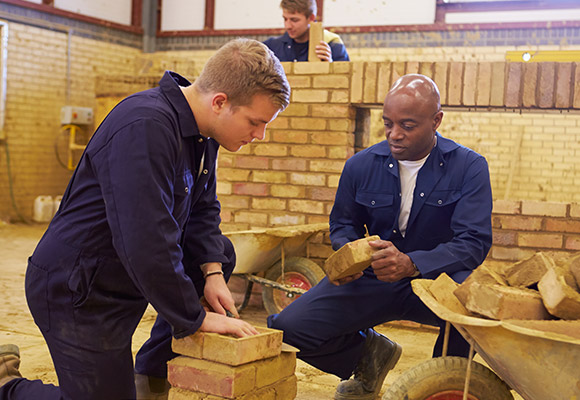With traditional construction apprenticeship routes facing unprecedented challenges, discover why your future in the industry might need an urgent rethink.
Understanding the Current Apprenticeship Landscape
The construction apprenticeship landscape in the UK is undergoing significant transformation. Recent data from the Construction Industry Training Board (CITB) shows that apprenticeship starts in construction have declined by 27% since 2019. Traditional apprenticeships have long been the backbone of skilled trade development, combining practical on-site experience with classroom learning. Today’s programmes typically span 2-4 years, with apprentices spending roughly 80% of their time on-site and 20% in formal training. The industry currently faces a critical skills shortage, with over 225,000 additional workers needed by 2027 to meet growing construction demands.
Key Challenges Facing Construction Apprenticeships
- Funding Constraints: Government funding cuts have reduced available places by 35% since 2020
- Skills Gap: Modern construction methods require new competencies not covered in traditional programmes
- Industry Volatility: Economic uncertainty leading to fewer employers offering apprenticeships
- Digital Integration: Increasing need for tech-savvy workers in traditionally hands-on roles
- Age Demographics: An ageing workforce with insufficient young people entering the trade
The Evolution of Modern Apprenticeship Programs
Modern construction apprenticeships are rapidly evolving to meet contemporary industry demands. Digital learning platforms now complement traditional instruction, with virtual reality simulations becoming increasingly common for safety training. Progressive programmes are incorporating modules on sustainable building practices, BIM (Building Information Modelling), and modern methods of construction (MMC). The introduction of degree apprenticeships has created new pathways for career progression, allowing apprentices to earn while working towards higher qualifications.
Alternative Pathways into Construction
- T-Levels: New technical qualifications with industry placements
- Specialist Training Programs: Short-course certifications in specific trades
- Higher National Certificates (HNCs): College-based construction qualifications
- Traineeships: Pre-apprenticeship programmes for basic skills development
- Modern Methods of Construction (MMC) Training: Specialised courses in emerging construction technologies
The Role of Industry Partners and Employers
Leading construction firms are taking proactive steps to address the apprenticeship crisis. Companies like Balfour Beatty and Kier have launched innovative training programmes, partnering with educational institutions to create bespoke apprenticeship schemes. Industry investment in apprenticeship training has increased by 15% year-on-year, with employers recognising the need to develop their future workforce. Smaller contractors are forming training consortiums to share resources and provide more comprehensive apprenticeship experiences.
Future-Proofing Your Construction Career
To secure your future in construction, it’s crucial to develop a diverse skill set that combines traditional craft skills with modern technological competencies. Data shows that apprentices who complete additional digital training modules earn 22% more than those who stick to traditional pathways. Focus on developing expertise in sustainable construction practices, digital tools, and project management alongside your core trade skills.
Government Initiatives and Support
- Apprenticeship Levy: Available funding for employers through the levy scheme
- Additional Support: Extra funding for employers taking on 16-18 year olds
- Grants and Incentives: CITB grants for training and assessment
- Skills Bootcamps: Free, flexible courses to develop specific construction skills
- Green Skills Funding: Additional support for sustainable construction training
Making an Informed Decision
Before committing to a construction apprenticeship, carefully evaluate your options. Consider the sector’s growth areas – sustainable construction, retrofit projects, and infrastructure development are projected to see 30% growth by 2025. Research potential employers’ track records in apprenticeship completion rates and career progression opportunities. Look for programmes that offer exposure to both traditional methods and emerging technologies.
Expert Recommendations and Next Steps
Industry experts recommend a blended approach to construction career development. Start by researching accredited training providers and examining their completion rates. Connect with potential employers through industry events and careers fairs. Consider joining professional bodies like the Chartered Institute of Building (CIOB) or the Federation of Master Builders (FMB) for additional support and networking opportunities. Most importantly, develop a clear career progression plan that accounts for both traditional skills and emerging technologies. The construction industry remains a viable and rewarding career path, but success increasingly depends on adaptability and continuous professional development.
FAQ
How hard is it to get an apprenticeship?
It’s highly-competitive To be an apprentice, you have to get out there, apply for work, impress at interview and be offered a job. You need to stand out as a must-hire candidate that an employer can see will be a good fit for their business with the potential to grow into the role and progress in the organisation.
Do you make money as an apprentice?
Pay: Apprentices receive at least the minimum wage specified by the Fair Labor Standards Act for hours on the job. Wage increases are earned as the apprentice gains and uses skills while working for the employer.
How does becoming an apprentice work?
Apprenticeships combine paid on-the-job training with classroom instruction to prepare workers for highly-skilled careers. Workers benefit from apprenticeships by receiving a skills-based education that prepares them for good-paying jobs.
How does the apprentice work?
An apprenticeship is a paid job where the employee learns and gains valuable experiences. Alongside on-the-job training, apprentices spend at least 20% of their working hours completing classroom-based learning with a college, university or training provider which leads to a nationally recognised qualification.
Sources
[1] https://www.apprenticeship.gov/apprenticeship-industries/construction
[2] https://abcva.org/apprenticeship/
[3] https://nabtu.org/apprenticeship-and-training/


Leave a Reply